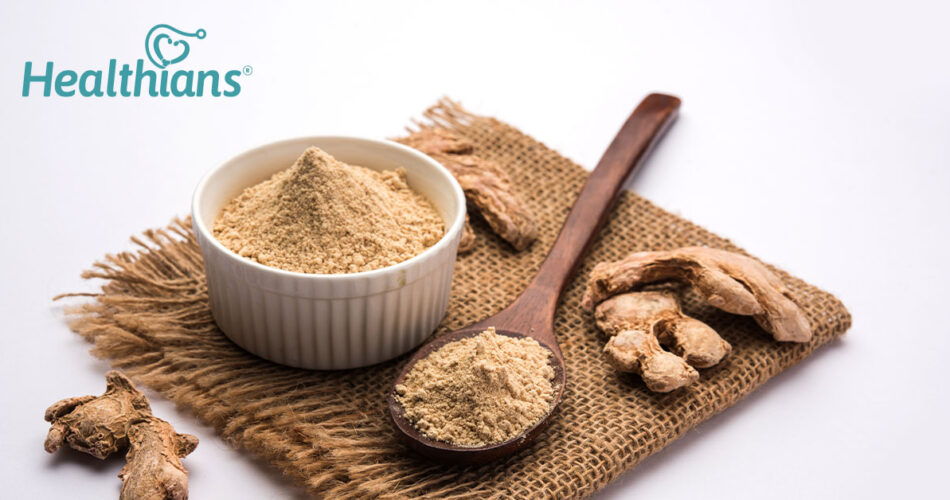Introduction
Ginger, scientifically known as Zingiber officinale, is a popular spice and herb that has been used for its medicinal properties for thousands of years. One of the most common forms of ginger used in cooking and as a health supplement is dried ginger powder, also known as sonth in Hindi. Ginger powder is made from dried ginger roots that have been ground into a fine powder.
It is rich in antioxidants and anti-inflammatory compounds that have numerous health benefits, such as reducing inflammation, improving digestion, and boosting immunity. However, like any other herb or spice, ginger powder also has its potential side effects that must be considered.
In this response, we will discuss the amazing benefits and potential side effects of ginger powder, to provide you with a comprehensive understanding of this popular spice.
Nutritional value of dried ginger powder:
Ginger powder is made by grinding dried ginger root into a fine powder. Ginger is a popular spice that is used in many cuisines around the world and is known for its distinctive flavor and aroma. It also has several health benefits and is often used in traditional medicine.
In terms of nutritional values, ginger powder contains several important vitamins and minerals, including:
- Vitamin B6: 0.16 mg (8% of the Daily Value)
- Iron: 1.3 mg (7% of the Daily Value)
- Magnesium: 20 mg (5% of the Daily Value)
- Potassium: 60 mg (2% of the Daily Value)
- Ginger powder is also a good source of dietary fibre, with 1 gram per teaspoon (2.6 grams)
In addition to these nutrients, ginger contains several bioactive compounds that are responsible for its health benefits, including gingerols and shogaols.
Health benefits of dried ginger powder or sonth:
Here are some of the benefits of dried ginger powder:
Anti-inflammatory properties:
Ginger contains compounds that have anti-inflammatory properties, which can help to reduce inflammation in the body. This can be beneficial for people with conditions such as arthritis, asthma, and inflammatory bowel disease.
Digestive health:
Ginger has been shown to improve digestive health by increasing the production of digestive enzymes and reducing inflammation in the gut. It can also help to alleviate symptoms of indigestion, such as bloating and gas.
Immune system support:
Ginger has immune-boosting properties, thanks to its high levels of antioxidants. These compounds help to neutralize free radicals in the body, which can damage cells and contribute to disease.
Nausea relief:
Ginger has been used for centuries as a natural remedy for nausea and vomiting. It can be particularly effective for nausea caused by pregnancy, chemotherapy, or motion sickness.
Pain relief:
It has analgesic properties, which means that it can help to reduce pain in the body. It may be effective for reducing pain associated with conditions such as arthritis, menstrual cramps, and headaches.
Ginger powder helps in lowering blood sugar levels:
Some studies have suggested that ginger may help to lower blood sugar levels by increasing insulin sensitivity. This could be beneficial for people with type 2 diabetes.
Cardiovascular health:
Ginger has been shown to have beneficial effects on cardiovascular health, including reducing blood pressure and improving blood lipid profiles. This could help to reduce the risk of heart disease.
Side effects of dried ginger powder
While dried ginger powder is generally safe for consumption and has many health benefits, there are some potential side effects to be aware of:
Heartburn: Ginger can increase the production of stomach acid, which may cause heartburn or other digestive discomfort in some people.
Allergic reactions: In rare cases, some people may experience an allergic reaction to ginger, which can cause symptoms such as itching, hives, or difficulty breathing.
Interaction with medication: Ginger may interact with certain medications, including blood thinners, diabetes medication, and high blood pressure medication. If you are taking any medication, it’s important to talk to your doctor before taking ginger supplements.
Diarrhea: Consuming large amounts of ginger may cause diarrhea or other digestive discomfort.
Skin irritation: Applying ginger directly to the skin may cause skin irritation in some people.
Lowering blood sugar levels: While this can be a benefit for people with diabetes, it can also be a risk for people who are already taking medication to lower their blood sugar levels.
It’s important to note that most people can consume ginger without experiencing any adverse effects. However, if you have any concerns about the safety of using ginger or experience any of the above side effects, it’s best to talk to your doctor.
Final thoughts
Dried ginger powder, also known as sonth, is a versatile spice that is widely used in Indian cuisine and traditional medicine. It offers many health benefits, including improving digestion, reducing inflammation, and relieving cold and cough symptoms.
However, it is important to note that excessive consumption of sonth can lead to side effects.
Therefore, it is recommended to consume sonth in moderation and consult a healthcare professional before incorporating it into your diet, especially if you have any pre-existing health conditions. With proper usage, sonth can be a valuable addition to your pantry and a natural remedy for a variety of health issues.




